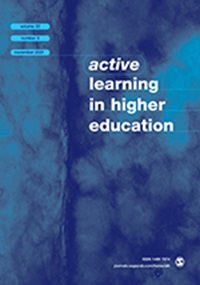主动学习策略和学术自我效能感与注意控制和对抄袭的态度有关
IF 3.2
1区 教育学
Q1 EDUCATION & EDUCATIONAL RESEARCH
引用次数: 36
摘要
积极的学习策略、目标、价值观、自我效能感以及学习动机都被认为会影响学生参与工作的深度。抄袭是一个常见的问题,必须反映出学生参与度低。学习和教学的认知视角应该考虑注意力控制的变化如何与学习动机和剽窃有关。本研究旨在阐明这些变量之间的关系,旨在为学习和教学实践提供信息。自我效能感、主动学习策略和学习价值观的提高与对剽窃的消极态度密切相关。注意控制与对剽窃的态度无关,但与提高自我效能感和积极学习策略密切相关。关于主动学习和自我效能如何受到注意控制过程的影响的研究应该有助于改进教学技术。在制定剽窃干预措施时,提高学生在学位期间的主动学习和自我效能应该被证明是特别有用的。本文章由计算机程序翻译,如有差异,请以英文原文为准。
Active learning strategies and academic self-efficacy relate to both attentional control and attitudes towards plagiarism
Active learning strategies, goals, values, self-efficacy and thus study motivation are all thought to affect the depth of student engagement with their work. Plagiarism is a common problem and must reflect a shallow level of student engagement. Cognitive perspectives on learning and teaching should consider how variations in attentional control might be implicated in both study motivation and plagiarism. This study aimed to elucidate the relationship between these variables, with the intention of informing learning and teaching practices. Increased self-efficacy, active learning strategies and learning values were robustly related to a more negative attitude towards plagiarism. Attentional control was unrelated to attitudes towards plagiarism, but was robustly related to increased self-efficacy and active learning strategies. Research concerning how both active learning and self-efficacy are affected by attentional control processes should be instrumental in improving teaching techniques. Increasing students’ active learning and self-efficacy during their degree should prove to be of particular utility when developing plagiarism interventions.
求助全文
通过发布文献求助,成功后即可免费获取论文全文。
去求助
来源期刊

Active Learning in Higher Education
EDUCATION & EDUCATIONAL RESEARCH-
CiteScore
13.20
自引率
12.00%
发文量
31
期刊介绍:
Active Learning in Higher Education is an international, refereed publication for all those who teach and support learning in higher education (HE) and those who undertake or use research into effective learning, teaching and assessment in universities and colleges. The journal is devoted to publishing accounts of research covering all aspects of learning and teaching concerning adults in higher education. Non-discipline specific and non-context/country specific in nature, it comprises accounts of research across all areas of the curriculum; accounts which are relevant to faculty and others involved in learning and teaching in all disciplines, in all countries.
 求助内容:
求助内容: 应助结果提醒方式:
应助结果提醒方式:


